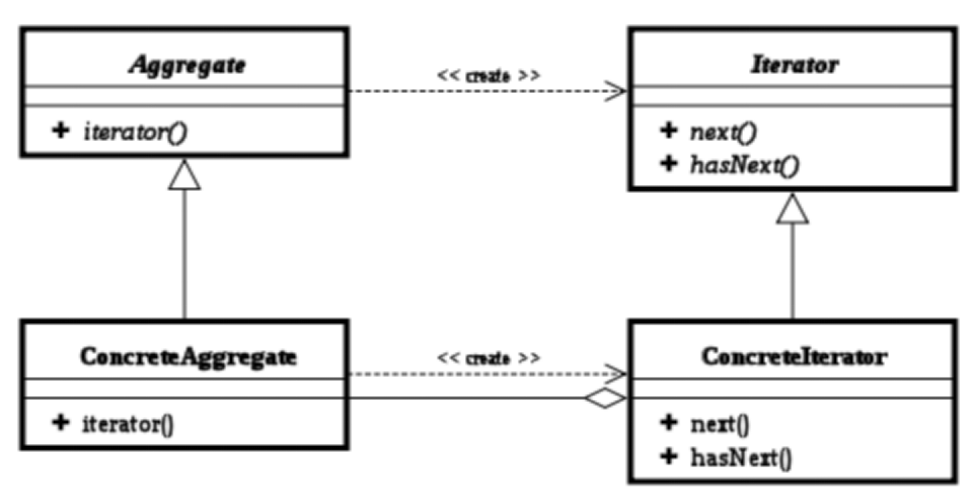一、什么是迭代模式
Iterator模式也叫迭代模式,是行为模式之 一,它把对容器中包含的内部对象的访问委让给 外部类,使用Iterator(遍历)按顺序进行遍历 访问的设计模式。
二、不使用迭代模式的应用
在应用Iterator模式之前,首先应该明白Iterator 模式用来解决什么问题。或者说,如果不使用 Iterator模式,会存在什么问题。
1.由容器自己实现顺序遍历。直接在容器类里直接添加顺序遍历方法
2.让调用者自己实现遍历。直接暴露数据细节给外部。
三、不使用迭代模式的缺点
以上方法1与方法2都可以实现对遍历,这样有问、 题呢?
1,容器类承担了太多功能:一方面需要提供添加删除等本身应有的功能;一方面还需要提供遍历访问功能。
2,往往容器在实现遍历的过程中,需要保存遍历状态,当跟元素的添加删除等功能夹杂在一起,很容易引起混乱和程序运行错误等。
四、使用迭代模式的应用
Iterator模式就是为了有效地处理按顺序进行遍历访问 的一种设计模式,简单地说,Iterator模式提供一种有效 的方法,可以屏蔽聚集对象集合的容器类的实现细节, 而能对容器内包含的对象元素按顺序进行有效的遍历访 问。
所以,Iterator模式的应用场景可以归纳为满足以下几个 条件:
- 访问容器中包含的内部对象
- 按顺序访问
五、迭代模式的结构

五、迭代模式的角色和职责
Iterator(迭代器接口): 该接口必须定义实现迭代功能的最小定义方法集 比如提供hasNext()和next()方法。
ConcreteIterator(迭代器实现类): 迭代器接口Iterator的实现类。可以根据具体情况加以实现。
Aggregate(容器接口): 定义基本功能以及提供类似Iterator iterator()的方法。
concreteAggregate(容器实现类): 容器接口的实现类。必须实现Iterator iterator()方法。
六、迭代模式的优点
1,实现功能分离,简化容器接口。让容器只实现本身的基本功能,把迭代功能委让给外部类实现,符合类的设计原则。
2,隐藏容器的实现细节。
3,为容器或其子容器提供了一个统一接口,一方面方便调用;另一方面使得调用者不必关注迭代器的实现细节。
4,可以为容器或其子容器实现不同的迭代方法或多个迭代方法。
书
1 public class Book { 2 private String ISBN; 3 private String name; 4 private double price; 5 6 public Book(String isbn, String name, double price) { 7 ISBN = isbn; 8 this.name = name; 9 this.price = price; 10 } 11 12 public String getISBN() { 13 return ISBN; 14 } 15 16 public void setISBN(String isbn) { 17 ISBN = isbn; 18 } 19 20 public String getName() { 21 return name; 22 } 23 24 public void setName(String name) { 25 this.name = name; 26 } 27 28 public double getPrice() { 29 return price; 30 } 31 32 public void setPrice(double price) { 33 this.price = price; 34 } 35 36 public void display() { 37 System.out.println("ISBN=" + ISBN + ",name=" + name + ",price" + price); 38 } 39 }
图书列表
1 import java.util.ArrayList; 2 import java.util.Iterator; 3 import java.util.List; 4 5 public class BookList { 6 private List<Book> bookList; 7 private int index; 8 private Iterator iterator; 9 10 public BookList() { 11 bookList = new ArrayList<Book>(); 12 } 13 14 //添加书籍 15 public void addBook(Book book) { 16 bookList.add(book); 17 } 18 19 //删除书籍 20 public void deleteBook(Book book) { 21 int bookIndex = bookList.indexOf(book); 22 bookList.remove(bookIndex); 23 } 24 25 // //判断是否有下一本书 26 // public boolean hasNext() { 27 // if(index >= bookList.size()) { 28 // return false; 29 // } 30 // return true; 31 // } 32 // 33 // //获得下一本书 34 // public Book getNext() { 35 // return bookList.get(index++); 36 // } 37 38 // public List<Book> getBookList() { 39 // return bookList; 40 // } 41 42 public Iterator Iterator() { 43 return new Itr(); 44 } 45 //迭代 46 private class Itr implements Iterator{ 47 48 public boolean hasNext() { 49 if(index >= bookList.size()) { 50 return false; 51 } 52 return true; 53 } 54 55 public Object next() { 56 return bookList.get(index++); 57 } 58 59 public void remove() { 60 61 } 62 } 63 }
测试
1 import java.util.Iterator; 2 3 public class MainClss { 4 public static void main(String[] args) { 5 BookList bookList = new BookList(); 6 7 Book book1 = new Book("010203","Java编程思想",90); 8 Book book2 = new Book("010204","Java从入门到精通",60); 9 10 bookList.addBook(book1); 11 bookList.addBook(book2); 12 13 // while(bookList.hasNext()) { 14 // Book book = bookList.getNext(); 15 // book.display(); 16 // } 17 18 // List<Book> bookDateList = bookList.getBookList(); 19 // for(int i = 0; i < bookDateList.size(); i++) { 20 // Book book = bookDateList.get(i); 21 // book.display(); 22 // } 23 24 Iterator iter = bookList.Iterator(); 25 while(iter.hasNext()) { 26 Book book = (Book) iter.next(); 27 book.display(); 28 } 29 } 30 }